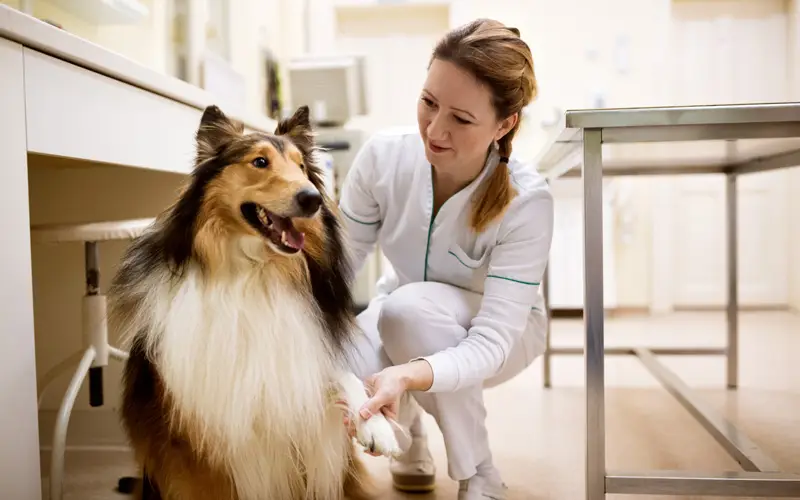
Does unrelenting work stress make you burned out, anxious, depressed or worse? If so, don’t accept it. Find help now.
Don’t worry if you’re a veterinarian struggling with mental health issues. You’re not alone; mental health problems are common in the veterinary profession. As a result, one out of six veterinarians has considered suicide, according to a study published in the Journal of the American Veterinary Medical Association. We created this support guide to aid you in getting the help you need.
Veterinarian Mental Health Crisis
There are many reasons why mental health problems are so common among veterinarians. First, the profession is highly stressful. Veterinarians deal with sick and injured animals every day and often have to make difficult decisions about treatment. They also deal with the stress of running a business, managing staff, practicing via telemedicine and covering payroll. In addition, many veterinarians work long hours and are on call at night and on weekends, which can lead to burnout.
Other systemic problems underlie the crisis in veterinary mental health. For starters, endemic staff shortages lead to overwork and exhaustion. When these conditions last indefinitely, a veterinarian’s sense of well-being may erode. This may lead to chronic depression and anxiety. Staff shortages also lead to poor work-life balance, which can harm a vet’s family life.
Compounding these problems is that veterinarians often become overwhelmed dealing with the suffering of pets and their owners, especially regarding end-of-life care. Psychologists call this phenomenon “compassion fatigue.” When vets get overwhelmed caring for suffering pets and pet owners, they may have nothing more to give. This creates guilt and further erodes their ability to withstand stress.
High debt load is a complicating factor, as well. Because veterinarians don’t earn as much as human physicians, it takes them longer to pay back their veterinary school student loans, further increasing their stress levels and resulting anxiety.
The high cost of care also makes veterinary medicine a high-stress career. Clients who can’t afford needed treatments often take it out on their pets’ caregivers. This is especially severe when a shortage of funds necessitates euthanasia for an animal that might otherwise recover. Clients often take their anger to social media when financial disputes arise, where they may seek to harm a veterinarian’s professional reputation. In extreme cases, they may even engage in bullying and threats of violence.
These issues create a perfect storm for well-meaning, kind-hearted veterinarians who want to help animals have better and longer lives. If problems persist, vets often view them as intractable. Loss of hope can lead to suicidal ideation in the veterinary industry. People who work in veterinary medicine face a higher chance of dying by suicide than members of the general population. The field also has one of the highest suicide rates of any career field.
Fortunately, there’s help available for veterinarians with modest and severe mental health conditions.
Mental Health for Veterinarians
Clinical depression and anxiety are the most common mental health problems among veterinarians. Other mental health issues that often afflict vets include post-traumatic stress disorder (PTSD), burnout and substance abuse. When these problems become severe, some vets decide they can no longer cope and try to end their lives. Many succeed.
Fortunately, vets have multiple avenues for seeking relief from their mental health problems. One is using self-help strategies to reduce stress and counteract depression and anxiety. The other is seeking professional help. Let’s take a look at each possibility.
Self-Assessment
The starting point is to begin monitoring your mental state each day. Do this by keeping a “mood diary” in which you note how you feel emotionally. You can also use your diary to talk to yourself about better ways to react to stressors.
Watching for and documenting typical veterinarian mental health conditions is essential. Here are some things to monitor:
- Unusual amount and duration of compassion fatigue
- Overwhelming feelings of burnout
- Generalized anxiety
- Difficulty concentrating and sleeping
- Depression, defined as a persistent feeling of sadness and hopelessness
- Unusual worries about practice finances
- Rumination about recent cases with bad outcomes, especially if you did nothing wrong
- Thoughts of harming yourself to escape your problems
If your mental health issues are manageable— i.e., you believe you can mitigate them independently— you can adopt one or several techniques we cover in the next section. However, if you’ve been struggling with severe depression, crippling anxiety or recurring thoughts of harming yourself, seek professional assistance immediately.
Self-Help Strategies
Here are some helpful strategies to reduce behavioral symptoms and foster long-term success:
- Breathe when you feel yourself getting stressed out– Drinking water is also helpful for resetting your stress response.
- Try to avoid perfectionism– Always seeking perfect solutions exacerbates stress and anxiety. In the real world, “good enough” is usually perfectly fine in most situations.
- Don’t compare yourself to others– That leads to envy and a lack of self-esteem. Better to focus on actualizing your talents than trying to copy someone else.
- Establish boundaries– Serving your clients is important. But letting them crowd out your personal life will ultimately be a disaster. Achieving a healthy work-life balance will make you a better veterinarian over the long term.
- Care for yourself– You’re an animal caregiver. It’s what you do. But, never lose sight of the importance of caring for yourself. Unless you sleep and eat well, exercise and engage in fun activities with family members and friends, you will run the risk of breaking down physically and emotionally, which does no good.
- Be grateful– With so much pain, suffering and death around you every day, it’s easy to begin fixating on negativity in your life. That’s unfortunate, because life then becomes dark, scary and sad. Yet, life isn’t always that way. It’s also full of joy, fun, positive accomplishments and progress. Remind yourself to celebrate the positive things in your world. Perhaps keep a gratitude journal in which you list the top three things you’re grateful for daily.
- Connect with people– Don’t fight your battles alone. Enlist other people in your life to help you. Discuss problems with your friends and family members. Speak frankly with a trusted colleague. Pursue therapy to learn more effective coping skills. The point is that no veterinarian is an island. You are part of a large community of people who understand what you’re going through. Reach out to them and ask for help when you need it.
Seek Professional Support
If self-help strategies don’t help you and you begin having thoughts of harming yourself, it’s time to seek psychiatric intervention. Check with your state veterinary group for referrals to mental health providers familiar with veterinarian mental health challenges. If you feel you’re on the brink taking your own life, call the National Suicide Prevention Hotline at 988.
360 Coverage Pros, is here to help. We offer coverages and information that matter to you and your business. Visit our website for the latest information on our products and services.







Share this page.